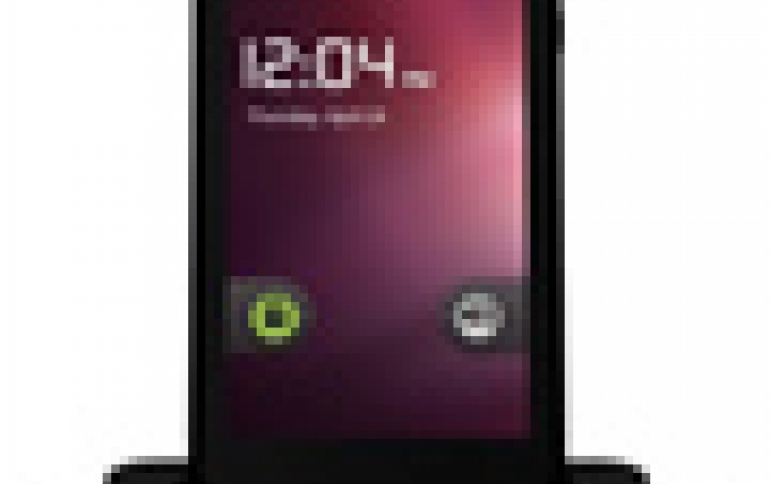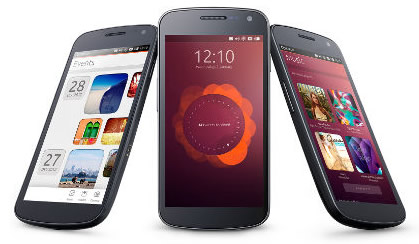
Ubuntu Comes to Android Phones
The Ubuntu operating system has been adapted to run on smartphones. Canonical has announced a smartphone interface for its operating system, which will allow users to run desktop apps on their handsets, allowing them to double for PCs when docked to monitors.
The code will initially be released as a file which can be installed on Samsung's Galaxy Nexus phone, replacing Android.
"We expect Ubuntu to be popular in the enterprise market, enabling customers to provision a single secure device for all PC, thin client and phone functions. Ubuntu is already the most widely used Linux enterprise desktop, with customers in a wide range of sectors focused on security, cost and manageability" said Jane Silber, CEO of Canonical. "We also see an opportunity in basic smartphones that are used for the phone, SMS, web and email, where Ubuntu outperforms thanks to its native core apps and stylish presentation."
Ubuntu is aimed at two core mobile segments: the high-end superphone, and the entry-level basic smartphone.

The handset interface for Ubuntu introduces new user experiences to the mobile market, including:
- Edge magic: thumb gestures from all four edges of the screen enable users to find content and switch between apps faster than other phones.
- Deep content immersion - controls appear only when the user wants them.
- A beautiful global search for apps, content and products.
- Voice and text commands in any application for faster access to rich capabilities.
- Both native and web or HTML5 apps.
- Evolving personalised art on the welcome screen.
Canonical provides engineering services to offload the complexity of maintaining multiple code bases which has proven to be a common issue for smartphone manufacturers, freeing the manufacturer to focus on hardware design and integration. For silicon vendors, Ubuntu is compatible with a typical Android Board Support Package (BSP).
In bringing Ubuntu to the phone, Canonical is placed with a single operating system for client, server and cloud, and a unified family of interfaces for the phone, the PC and the TV.
The new version has been designed to work on last and current-generation Android handsets which share the Linux kernel.
Phones running the software will be showcased at the Consumer Electronics Show (CES) in Las Vegas next week.
Ubuntu's founder, Mark Shuttleworth, said he was in talks with manufacturers for devices to be sold with the system pre-installed within the year.
"We expect Ubuntu to be popular in the enterprise market, enabling customers to provision a single secure device for all PC, thin client and phone functions. Ubuntu is already the most widely used Linux enterprise desktop, with customers in a wide range of sectors focused on security, cost and manageability" said Jane Silber, CEO of Canonical. "We also see an opportunity in basic smartphones that are used for the phone, SMS, web and email, where Ubuntu outperforms thanks to its native core apps and stylish presentation."
Ubuntu is aimed at two core mobile segments: the high-end superphone, and the entry-level basic smartphone.

The handset interface for Ubuntu introduces new user experiences to the mobile market, including:
- Edge magic: thumb gestures from all four edges of the screen enable users to find content and switch between apps faster than other phones.
- Deep content immersion - controls appear only when the user wants them.
- A beautiful global search for apps, content and products.
- Voice and text commands in any application for faster access to rich capabilities.
- Both native and web or HTML5 apps.
- Evolving personalised art on the welcome screen.
Canonical provides engineering services to offload the complexity of maintaining multiple code bases which has proven to be a common issue for smartphone manufacturers, freeing the manufacturer to focus on hardware design and integration. For silicon vendors, Ubuntu is compatible with a typical Android Board Support Package (BSP).
In bringing Ubuntu to the phone, Canonical is placed with a single operating system for client, server and cloud, and a unified family of interfaces for the phone, the PC and the TV.
The new version has been designed to work on last and current-generation Android handsets which share the Linux kernel.
Phones running the software will be showcased at the Consumer Electronics Show (CES) in Las Vegas next week.
Ubuntu's founder, Mark Shuttleworth, said he was in talks with manufacturers for devices to be sold with the system pre-installed within the year.



















